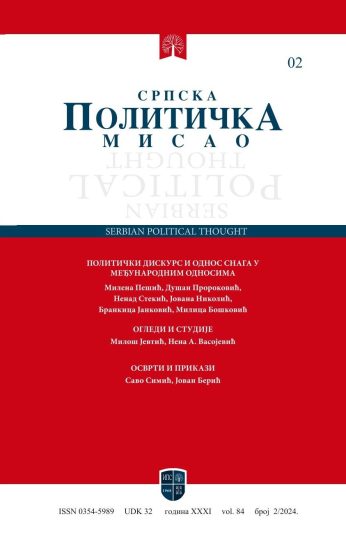ESSAYS AND STUDIES
WAR VETERANS: PERCEPTION OF THE INSTITUTIONAL SUPPORT
Abstract
The paper deals with the attitude of state institutions towards war
veterans in Serbia, viewed from the perspective of veterans. In addition
to the perception of the social policy towards veterans, the paper aimed
at showing the social position of war veterans within the sociological
theories of war, which understand the war and organized violence in
the macrostructural processes of the long bureaucratic organization of
the state and legitimizing ideologies. Since we observe war as part of
a modern state, and not only as an isolated incident or anomaly, the
researcher’s intent was to bring light to one part of this whole which
has been insufficiently represented in research, and which in peacetime
conditions reveals the processes that are related to the war.The research
involved 30 war veterans who participated in the wars in the territory
of the former Yugoslavia. They were questioned using a semi-structured
interview method. The aim of the research was to determine the opinions,
attitudes and experiences of war veterans about their own position in
society through the most important aspects of interaction with state
institutions. The results of the research show that what predominates the
respondents’ self-perception is dissatisfaction because of: a) the (non)
recognition of the differences that participation in war entails, that is, the
specificity of the difficulties in the process of transition from wartime to
peacetime conditions, b) the stereotypical and labeling attitude of civil
servants, c) the fragmentation of the veteran population in the form of
discriminatory practices of the justice system.The obtained findings
suggest that the created institutional prerequisites for social inclusion are
not sufficient for the members of the studied group to be able to deal with
apparent problems, but even more with latent obstacles in their attempt to
„continue living“ in peacetime conditions, which they put on hold at one
point in the past to participate in war as military conscripts.
With the state politics that discriminates them, the social
environment that belittles their war efforts and the civil sector that blames
them for participating in the wars, war veterans are a good example of
transferring guilt from the structural to the individual level. If we add
extremely unfavorable existential conditions of the total low-skilled labor
force, in the third age of life, with poor physical health and a perception
of a lack of perspective, we can say that war veterans from Serbia have
lost another battle, the one with the nation-state to whose call for defense
they willingly responded. In practice, when the nation’s narrative, on
which all modern nations states are established, “descends” to specific
members of the nation, it turns into a budgetary burden. Some future
war employers should calculate the cost of rehabilitating war veterans
and the care of the families of fallen soldiers in the cost of projected
wars. Instead of a realistic compensation for the sacrifice, war veterans
say that the wars in which they participated do not have the ideological
legitimacy they once had and, consequently, nor does their sacrifice that
they would institutionalize through special rights. Absolute domination
over the means of coercion, as well as the similarity of bureaucratic
institutions with military structures, whose functioning they known well
from the war, send a clear message about the state’s supremacy in any
eventual protest against the social inequalities they are experiencing.
References

